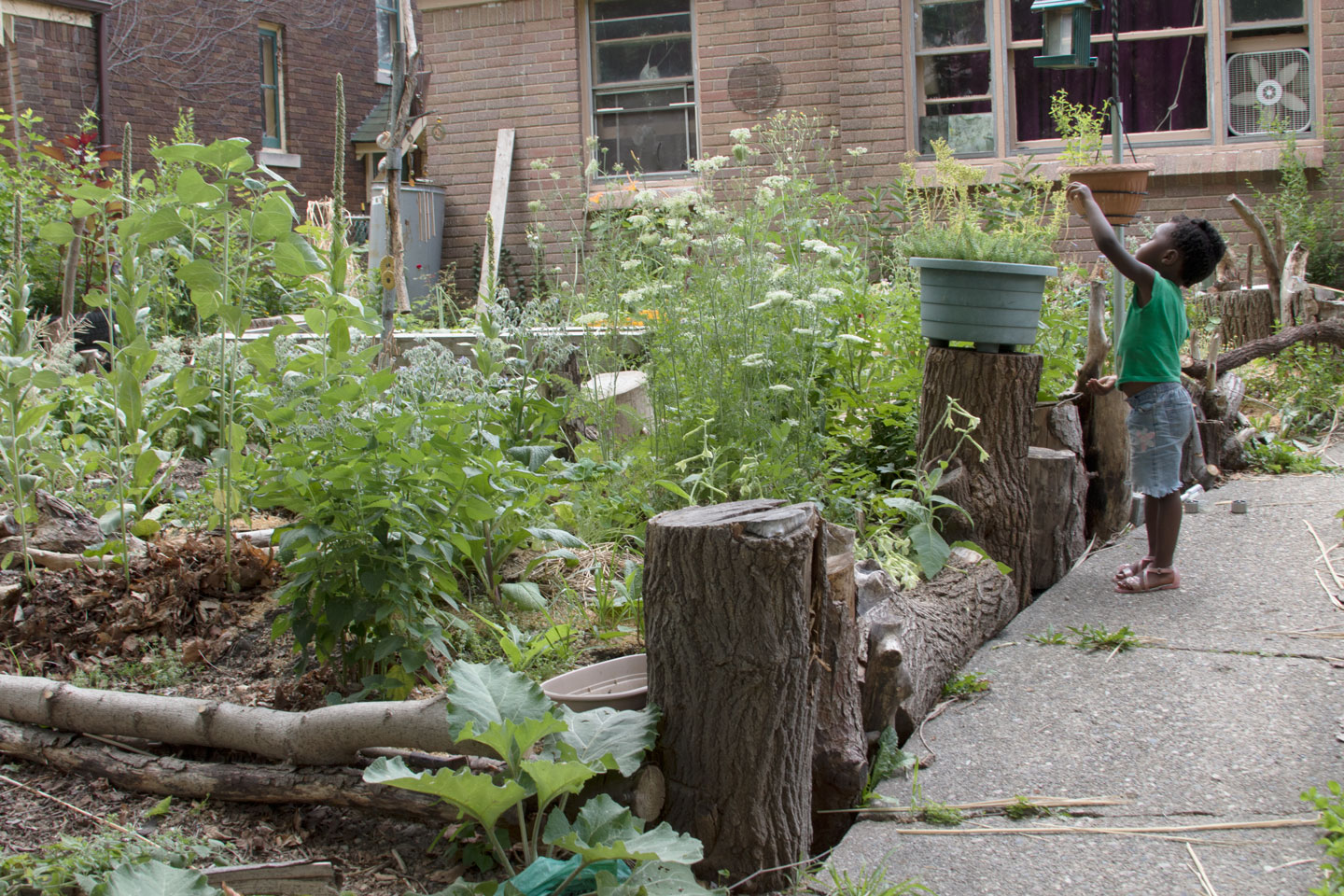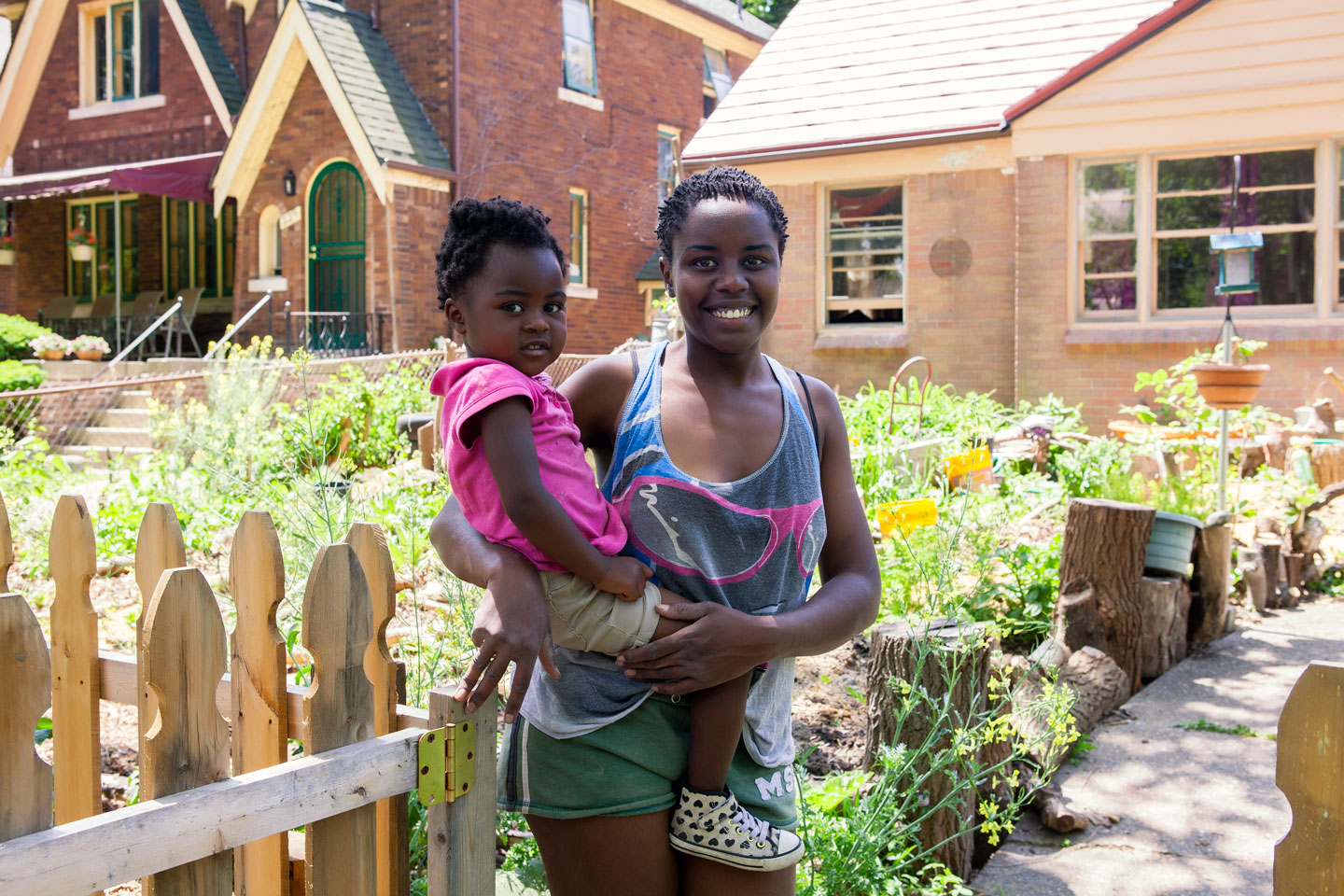by Vivian Henoch
Meet Atieno Nyar Kasagam, MSU grad, urban gardener and resident of neighborhood farm, Founder of the Detroit African Coalition for Liberated Land, awarded top prize in Do It for Detroit’s 2016 grant competition, sponsored by Yad Ezra, NEXTGen and Repair the World, in support of Detroit’s Food Justice Movement.
Tending to garden beds overflowing with salad greens, vegetables and medicinal herbs, Atieno Nyar Kasagam breaks into her sparkling smile, “I’m still a city girl at heart,” she says.
Originally from Nairobi, Kenya, Atieno, 26, has spent most of her young adult life away from her parents. At the age of 14, she attended a boarding school in the nearby town of Kikuyu. From there, she was selected to attend an elite pre-college high school in Johannesburg, South Africa, as part of a Pan-African inaugural class focusing on entrepreneurism and leadership development. Upon graduation, 90% of that class came to the U.S. for college. As Atieno observes, “The concept was to push us into an international arena for a more complex perspective on how we might reimagine our lives, our countries and our world.”
World citizen on a journey
Matched with Michigan State University, Atieno earned her degree in public policy. During those college years in East Lansing, her journey would take a number of surprising turns. In her freshman year, she met Lorenzo Herron from Detroit – an agricultural business major in his senior year.“Lorenzo was very interested in connecting to his African roots,” Atieno recalls, “and I was drawn to learning about the African Diaspora and the history of Africans sold into slavery.”
It was in Lansing where Atieno and Lorenzo were married. There, along with Lorenzo, her interests turned to earth work – the science and politics of community gardening and farming. In tending a garden – first to assist as fellow student, then on her own, Atieno began to learn about the plants native to both Michigan and her own homeland.“My initial move was to call my mom to ask her what seeds to buy, because my instinct was to grow things we would have eaten at home. Going back to my own roots in Kenya, I realized that I was following a tradition of women who have been gardening for their families and communities for generations.”
In 2013, Atieno and Lorenzo moved to a house across the street from Lorenzo’s parents’ home in the Jefferson-Chalmers neighborhood in southeast Detroit. Today, on the very street where Lorenzo grew up, they’ve started their family, and turned their lot into the urban farm they call Ile Oko, “House of Agriculture.”
“We’ve come a long way,” says Atieno. As an MSU business major, Lorenzo’s focus has been on growing produce for market, heading deeper now into the science and botany of plants. My goal has been to incorporate indigenous African produce and, much to my surprise, I’ve found that American plants are very similar or the same as African plants. Learning to properly identify them has set me off on a journey and initiative to bring plots of blighted land in our city back to life.
Detroit African Women’s Coalition for Liberated Land: Q & A with Atieno
myJewishDetroit: What is your definition of food justice?
A: Food justice recognizes that food is a human right.It’s about guaranteeing access to adequate, nutrient dense, sustainable and culturally relevant food to all human beings — no ifs ands or buts.
Describe your organization
The Detroit African Women’s Coalition for Liberated Land is a partnership of women of color across the city, with the goal to pool our funds and resources to purchase vacant land and then to cultivate fruit trees and edible native plants which will be freely accessible to the community.
Why fruit trees?
As urban farms are proliferating in Detroit to provide fresh produce for the neighborhoods, I believe there needs to be a lot more energy directed toward planting orchards, because one of the things those of us who farm still buy in the grocery is fruit. Fruit trees yield an abundance that begins to describe a produce crop that you can take to market.

Trees are not temporary. What we have in mind is to develop permanent greenspaces in the city that also will function as a park system, with walkways and benches, pushing the concept of community spaces and safe places for families. As we acquire and clear one lot at a time, the fruit trees we plant will be there longer than we are alive. And under the trees, herbs and medicinal plans will naturally grow as we revitalize the land. We envision a new, more complex landscape, the kind of landscape that more of our cities need.
Who are your partners in the venture?
Our core team for purchasing land from the Detroit Land Bank and developing it includes Brother Nature Farms (for ploughing), Freedom Freedom Farms (for technical support), Detroit Urban Farmers Network and the Garden Resource Program. The Detroit Black Community Food Security Network is acting as fiduciary for our venture to receive the $3,000 check from the grant received from Do It for Detroit.
At the cost of $100 per lot, the funding has a lot of potential for us. Currently, we have identified a number of contiguous empty lots around the Eastern Market, thinking in terms of purchasing as many as 18 parcels. We plan to use the remainder of the grant to mow, clear, compost and prepare the soil for planting.
How have your neighbors responded to your farm on a residential street?
We had mixed responses at first. There are those who would prefer a more traditional lawn in front of our house. But they are getting over it. With the pressure of global warming, water scarcity and food access in urban spaces these days, there’s more conversation about having mixed landscapes such as ours. And honestly? I’m not entirely opposed to grass. If we had more land, ourselves, we’d have some grass for our daughter to play on.
Where do you see yourself in the near future?
Lorenzo and I are young, open to new ideas and adventure. At 26, I can’t say what our future will hold. But Detroit always will be one of the places that I call home. My husband was born and raised in Detroit. Our daughter was born here. Detroit has been a one of those pillars that will shape what will be for me.
Though I’ve lived on my own, away from my family a long time, there’s a part of me that has to go back to family and to build in Africa what we’ve started here. My ideal would be to keep feet in both worlds, spending time with my family in their home in Nairobi during the winter cycle and returning for the planting season here. Back home in Kenya, my parents don’t own a lot of land, so there’s a challenge. And there’s so much to learn about the things we must do to repair the damage that we’ve been doing to this earth. For Lorenzo and me, it’s a journey that’s just beginning.




